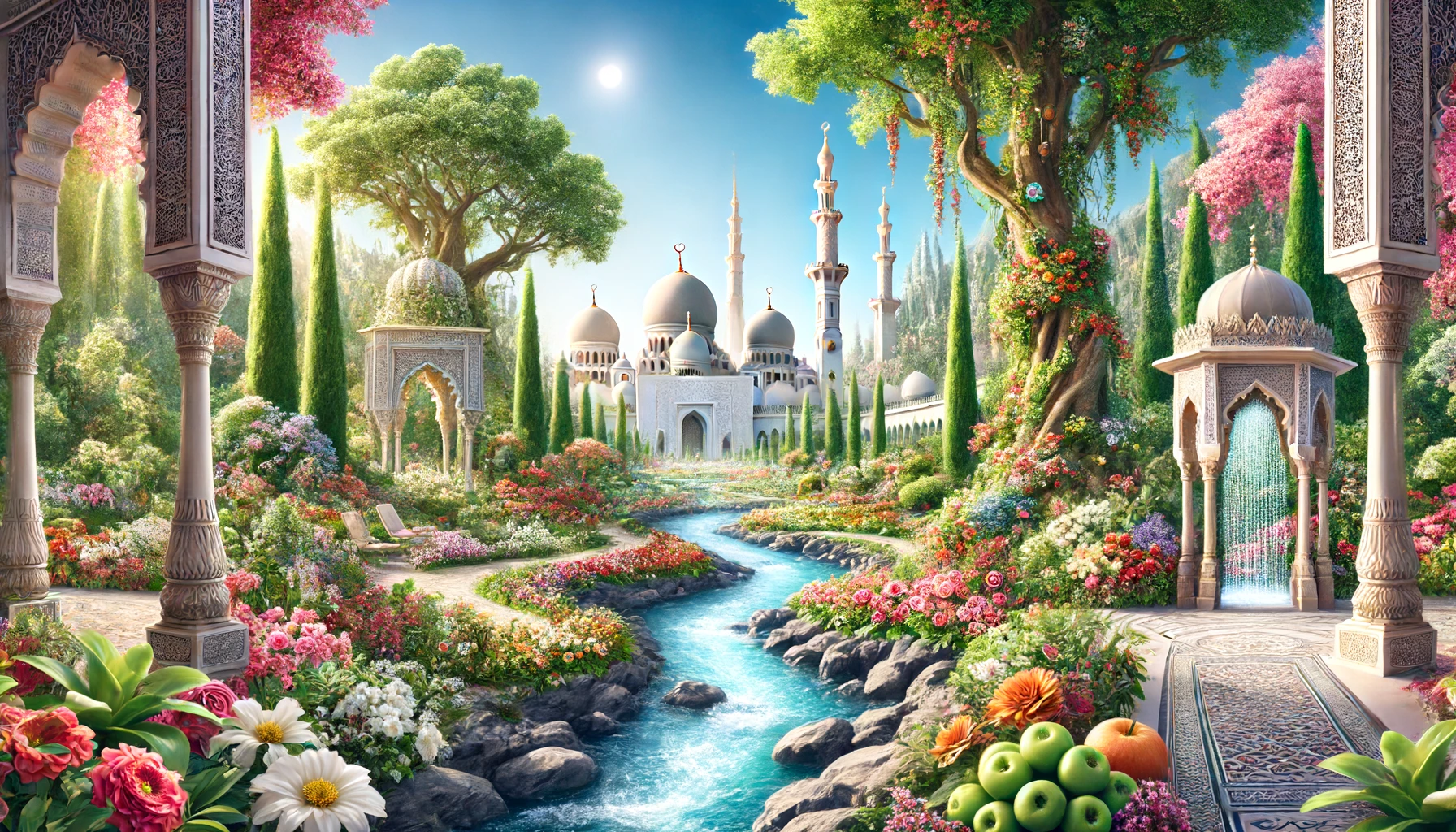What is Islam? A brief introduction to Islam
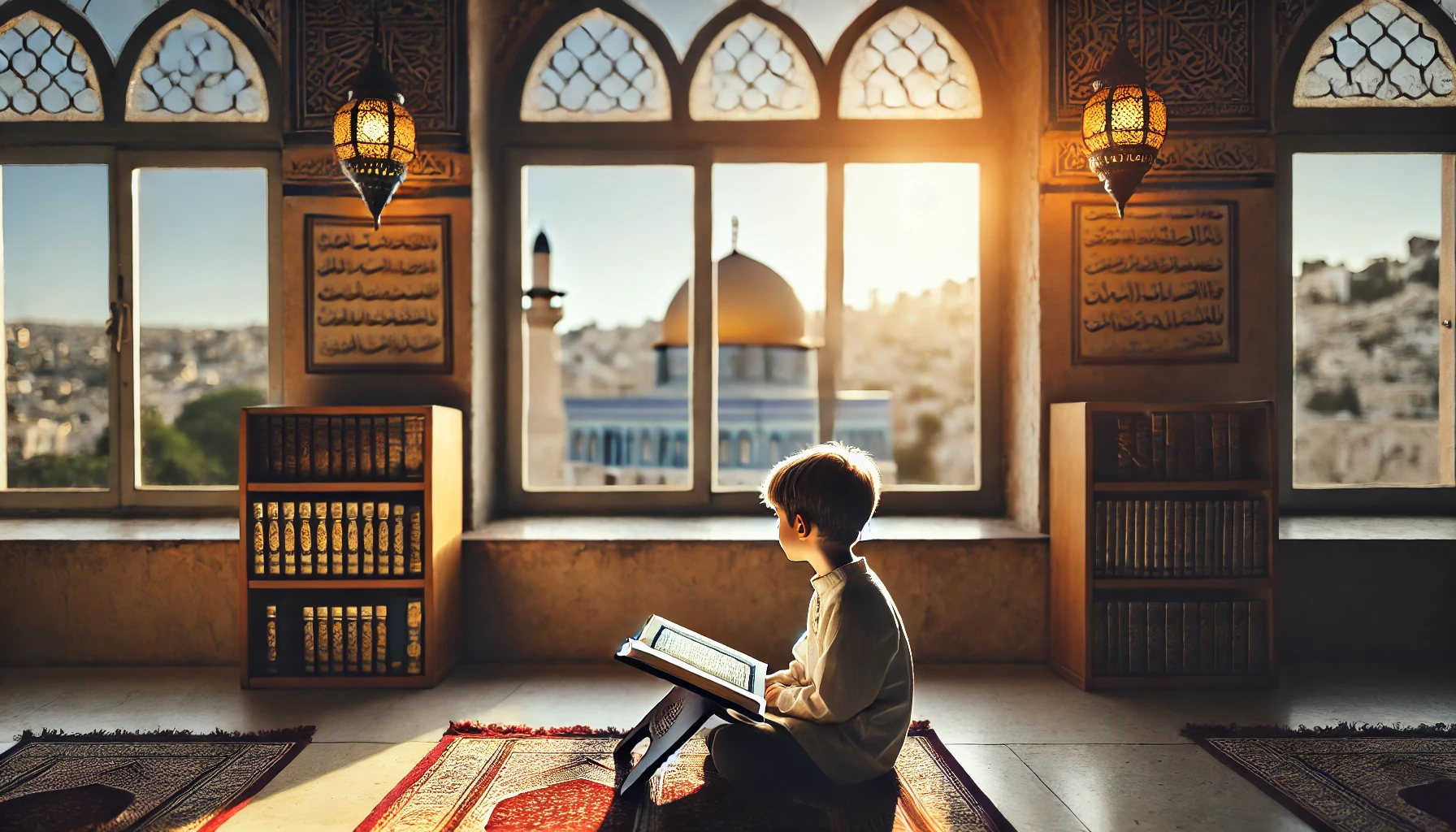
You might have encountered information about Islam through the media, conversations with friends or colleagues, or while exploring the internet. While Islam is the second most widely practiced religion in the world, it is also among the most misunderstood.
Grasping Islam’s true teachings in a sea of misinformation and misconceptions can be daunting. This guide aims to help anyone interested in learning about Islam from credible sources.
What is Islam
Etymology of the word Islam
From Arabic إسلام, ʾislām (“submission (to God)”), it is an action noun (Arabic اسم فعل, ism fi’l), derived from a Semitic radical, s.l.m, which designates the act of submitting oneself willingly, of giving allegiance. Islam is, therefore, the act of submitting and surrendering to God.
Islam is fundamentally a worldview centered on believing in one God and a commitment to His commandments. A Muslim (مسلم) is a person who adheres to Islam.

“This cosmic order, which governs the universe from the particle to the galaxies, is the law of God, the creator and master of the universe. Since the whole of creation obeys divine laws, we can say that the whole universe literally follows the religion of Islam, for Islam means nothing other than submission and obedience to Allah, the lord of the universe.”
Understanding Islam, Abu Ala al-Maududi
Islam: Not Just a Religion, but a Way of Life
Although Islam can be described as a religion, it is seen by its adherents—almost a quarter of the world’s population—in much broader terms.
Islam is not just about believing in doctrines and performing rituals; it is a comprehensive way of life that aims to bring God to the forefront of one’s awareness and, consequently, one’s everyday existence.
Islam is a complete and holistic way of life that covers all aspects. It leaves no stone unturned, teaching mankind how to behave in all areas of life: individual, social, material, moral, ethical, legal, cultural, political, economic, and global.
Islam appears to me like a perfect work of architecture. All its parts are harmoniously conceived to complement and support each other; nothing is superfluous and nothing lacking; and the result is a structure of absolute balance and solid composure.
Leopold Weiss (1900-1992), who converted to Islam and became Mohammed Asad in 1925.
When did Islam begin?
The name “Islam” was instituted by the Quran, the sacred scripture revealed to Muhammad(ﷺ) (peace be upon him). However, Islam is not a new religion. Instead, it represents the latest reiteration of the primordial message of God’s unity, a theme in ancient monotheistic religious traditions.
Islam began among human beings with the first man, “Adam,” the first of the prophets and the first of the believers. He passed on the faith to his children, which continued for generations before mankind turned away from it and devoted itself to other deities. Consequently, God sent prophets to every community to re-establish God’s religion :
So is the history of mankind, Abraham, Isaac, and Jacob (Israel) were all Muslims:
Jesus and his apostles were Muslims:
Of course, even if God’s religion was always the same, the rituals of each community were different:
Who is Allah?
Allah? God?
The Arabic word “Allah” literally means “The God.” Muslims understand Allah as the proper name of the Creator, as referenced in the Quran. The name “Allah” is analogous to “Eloah,” a Semitic term found in the divine scriptures revealed to Muhammad(ﷺ)’s predecessors, Moses and Jesus (peace be upon them all). It should be noted that Jesus (peace be upon him), who spoke Aramaic—a Semitic language closely related to Arabic—used the word ܐܰܠܳܗ (pronounced: AaLaH) to designate God. This highlights the linguistic and conceptual continuity among these monotheistic religions.
The use of the term “Allah” is not limited to believers in Islam—Arabic-speaking Christians and Jews also use “Allah” about God, demonstrating that followers of Islam, Christianity, and Judaism believe in a familiar monotheistic Creator. While English speakers call Him “God” and French speakers refer to Him as “Dieu,” Muslims, regardless of their mother tongue, use the Arabic word “Allah.”
Allah the Creator
Muslims believe that Allah has no partners or associates who share His divinity or authority and that Allah is transcendent, unlike His creations, and therefore has no physical form. It is also not believed that Allah exists in, or is represented by, any material object.
The Quran contains several divine attributes or “names” that describe Allah. Some commonly known attributes include Most Merciful, Most Forgiving, Most Exalted, Unique, and Eternal. These names reflect the various aspects of Allah’s nature and help humans comprehend His attributes and essence.
For Muslims, the Oneness of Allah increases awareness that all life is bound by Divine Law emanating from a single source and that life has a meaning and purpose that revolves around awareness of Allah’s presence.
Moreover, belief in a single Creator obliges conscientious Muslims to consider all humanity an extended family and to treat others with justice and fairness. The Muslim vision of Allah also inspires respect for the environment and natural resources.

In Islam, human beings, like other creations, are considered to be utterly different from Allah. However, they may aspire to display various attributes Allah manifests, such as justice or mercy. Moreover, even if Allah is beyond traditional human perception, the Quran declares:
Prophet Muhammad(ﷺ)
The prophets
From the beginning of mankind to today, Allah has sent a Prophet to every nation to guide them to the truth. Allah sent them to teach their people to worship Allah alone and to attribute no divine partner to Him.
The names of these prophets may sound familiar. They include Adam, Nuh (Noah), Ibrahim (Abraham), Ismail, Ishaq (Isaac), Yaqub (Jacob), Jesus, Muhammad(ﷺ), and many others (peace be upon them all).
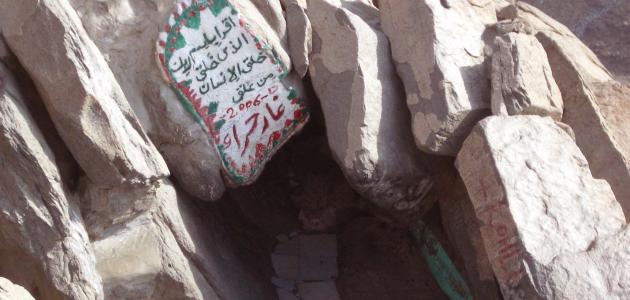
Muslims believe that Jesus is a prophet of God rather than a divine being or son. We’ll cover this difference in faith between Muslims and Christians in a future guide.
Prophet Muhammad(ﷺ)
This chain of prophecy began with Adam and ended with Muhammad(ﷺ), the last Prophet of Allah. He was born in Makkah in 570, about six centuries after Jesus. Known throughout the city for his honesty and truthfulness, Muhammad(ﷺ) was chosen to be a prophet of Allah at 40.
He was chosen when mankind had drifted away from the original message of Islam taught by earlier prophets. Muslims believe that people distorted the Gospel, Torah, and other scriptures after the death of their prophets.
Allah sent the archangel Gabriel to reveal the Quran to Muhammad(ﷺ) to spread Islam’s correct and pure teachings across the world. Allah endowed Muhammad(ﷺ) with the ability to convey this message successfully, and today, approximately 1.9 billion people embrace this faith, grateful for the blessing of calling themselves Muslims.
The Quran and Hadith
The Quran: The Last Revelation
The word “Quran” literally means “the reading” or “the recitation” and refers to the divinely revealed scriptures given to Muhammad(ﷺ). Since Muhammad(ﷺ) is Allah’s last Prophet, the Quran is regarded as Allah’s final revelation to mankind.
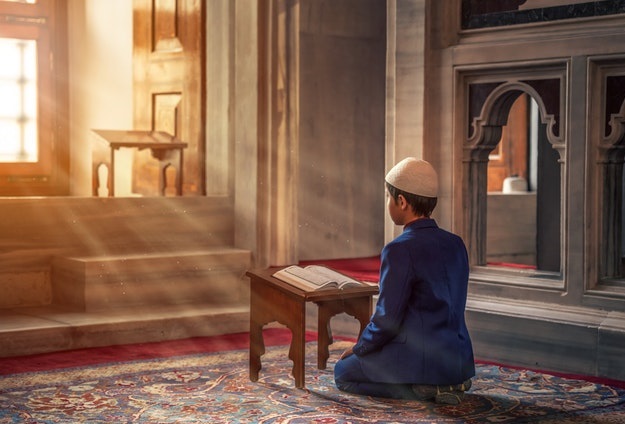
The Quran, considered by Muslims as the literal speech of Allah, was revealed to Muhammad(ﷺ) in Arabic. Throughout Muhammad(ﷺ)’s mission as a prophet, which spanned nearly twenty-three years from 610 to 632 CE, he received the chapters and verses of the Quran. Contrary to popular belief, Muhammad(ﷺ) did not author the Quran. Instead, he served as this divine revelation’s chosen recipient and transmitter.
Muhammad(ﷺ) also embodied the principles and commandments of the Quran. His words or sayings, known as Hadith, differ from the divine origin of the Quran’s content. This distinction highlights the Quran’s unique status as the direct word of Allah, as opposed to the Hadith, which are teachings based on Muhammad(ﷺ)’s life and words.
I did not come into contact with any Muslim before I embraced Islam. I read the Quran first and realized no person is perfect, Islam is perfect, and if we imitate the conduct of the Holy Prophet… we will be successful.
Cat Stevens (Yusuf Islam)
The Preservation of the Quran
Muhammad(ﷺ) received the verses of the Quran and repeated them to his companions and other Muslims, who wrote them down, recited them, and memorized them. He typically led formal worship five times daily, reciting the revealed verses according to the established procedure. Designated Muslims also recited these verses aloud at dawn, before prayer, and on other important occasions. From the beginning, Quranic verses played an immediate and practical role in the spiritual lives of Muslims.
Before his death, the Prophet (peace be upon him) organized the 114 chapters of the Quran into the order we see today. Muslim and non-Muslim scholars affirm that the Quran has remained intact and unchanged. This aspect of the Quran is unique compared to other scriptures, which have undergone many alterations.
Translations of the Quran are available worldwide, including in English, Spanish, French, German, Urdu, Chinese, Malay, Vietnamese, and others. However, while translations provide useful renderings or explanations of the Quran’s contents, only the original Arabic text is considered the authentic Quran.
Hadiths
The Hadith is the second primary source of Islamic teachings after the Quran. In Arabic, the term “Hadith” means “the saying.” It refers to a collection of the words, deeds, and memoirs of the Prophet Muhammad(ﷺ) as preserved by those who were close to him. These accounts were meticulously refined and compiled into books. The most authentic collections are those by Malik, Al-Bukhari, Muslim, At-Tirmidhi, Abu Dawud, An-Nasai, and Ibn Majah.
The Five Pillars of Islam
Pillar 1: Belief in One God and Testimony of Faith (Tawhid)
Tawhid (pronounced tow-heed) is an Arabic term that refers to the unique belief in the oneness of God. It represents Islam’s concept of monotheism and forms the foundation of the religion’s fundamental principles.
It signifies the belief that only one divine being is worthy of worship—Allah. When Muslims mention the name Allah, they are referring to the one true God of the universe.
Tawhid is the first and most important of the five pillars of Islam. Believing in and acting upon this pillar is essential for entering Islam. To become a Muslim and join Islam, a person must pronounce the testimony of faith, known as the shahada in Arabic. The testimony of faith is a single declaration:
لآ اِلَهَ اِلّا اللّهُ مُحَمَّدٌ رَسُوُل اللّهِ
“Laa ilaha illa Allah Muhammad Rasoolullah”
This phrase means, “There is no god but Allah, and Muhammad(ﷺ) is His Messenger.”
It involves acknowledging and believing that no one deserves to be worshipped except Allah and that Muhammad(ﷺ) is Allah’s Messenger. This foundational belief in Allah underlies the entire religion of Islam and all its teachings.
The testimony of faith (shahada) is the most critical element in a Muslim’s life. The words “La ilaha illAllah” are proclaimed at the call to prayer and in sermons. They are the phrase upon which the earth and heavens were established. Every unique creation was made for this declaration. It is the phrase that distinguishes a Muslim from a person of another religion.
There are two parts to the first half of the testimony of faith. Let’s break it down:
لآ اِلَهَ اِلّا اللّهُ
“Laa ilaha illa Allah”
“Laa ilaha illa Allah” translates to “there is no god but Allah” or “no one has the right to be worshipped except Allah.” This part of the testimony nullifies any form of worship directed at anyone or anything other than Allah. In Islam, worshipping other divine beings or idols is considered a grave sin.
By uttering this sentence, you affirm that Allah alone is the Creator, Sovereign, and Sustainer of all things and that He alone deserves our worship. This declaration forms the core of a Muslim’s faith and separates Islamic monotheism from other beliefs.
مُحَمَّدٌ رَسُوُل اللّهِ
“Muhammad Rasoolullah”
The second half of the testimony of faith is “Muhammad(ﷺ) is the Messenger of Allah.” Believing in this statement means acknowledging that Muhammad(ﷺ) is indeed Allah’s Messenger. It also entails following his teachings, obeying his commands, abstaining from what he has forbidden, and worshipping Allah exclusively in the manner he has prescribed.
Moreover, by affirming this part of the shahada, you believe that Allah sent Muhammad(ﷺ) as His Messenger, revealed the Quran to him, and commanded him to call the people to Tawhid—the belief in the oneness of God. This commitment shapes how Muslims live their faith, emphasizing adherence to the Prophet’s example as a crucial aspect of their religious life.
Pillar 2: Prayer (Salat)
Prayer is the second most important pillar of Islam and the first thing for which a person will be held accountable on the Day of Judgment.
If a person’s prayer is good, then they will succeed. However, if it is incorrect in some way, they will have failed. Every sane adult Muslim is required to observe five obligatory prayers daily. Allah provides guidance on these prayers in the Quran:
The five daily prayers are:
- Fajr – Early morning, before dawn.
- Dhuhr – Noon, just after the sun passes its zenith.
- Asr – Mid-afternoon, before the sun begins to set.
- Maghrib – Just after sunset.
- Isha – At night, after nightfall.
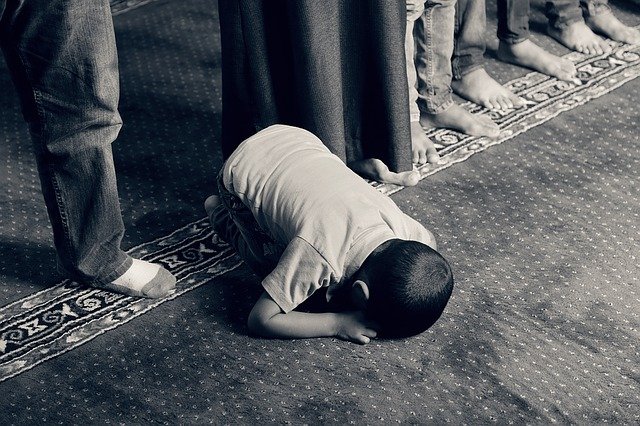
Prayer serves as a vital link between a person and Allah. It establishes an intimate relationship between an individual and his Creator and must be performed with utmost sincerity and dedication.
Pillar 3: Zakat
Zakat is the third pillar of Islam. It involves giving a specific part of a Muslim’s wealth to those in need once a year to support specific categories of people. The amount is typically around 2.5% of total wealth, which includes asset classes such as:
- Gold and silver
- Precious metals
- Stocks and shares
- Real estate
- Cash
- Livestock
These are the most common asset classes for which Zakat is paid. The linguistic meaning of “zakat” is “that which purifies.” It is seen as a way for Muslims to purify their wealth and income. Like prayer (salah) purifies a person’s soul, Zakat purifies your assets and earns you Allah’s pleasure because your wealth is distributed to those in need. Giving helps alleviate poverty and serves as a spiritual cleansing for the giver.
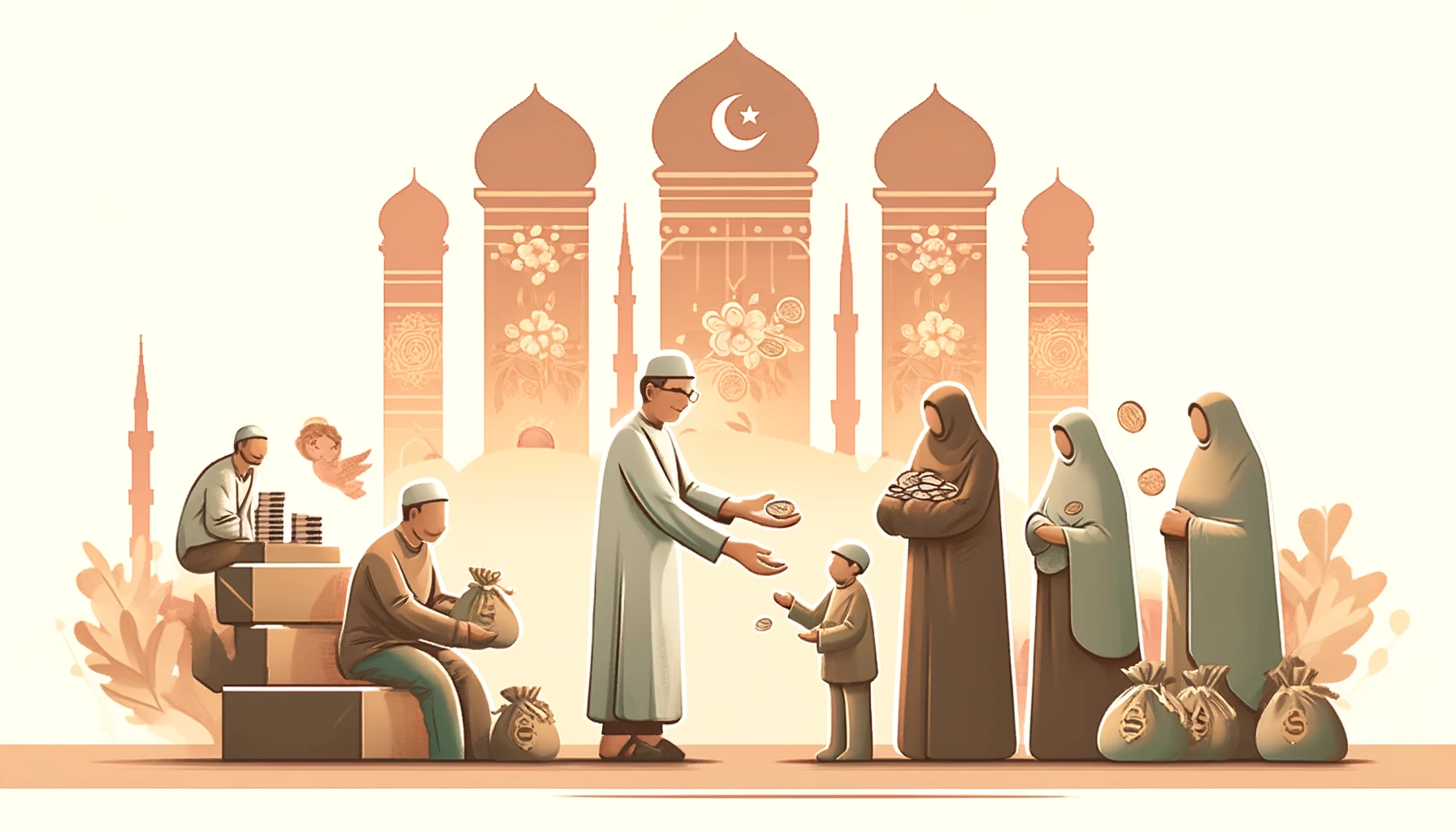
Allah has enjoined Zakat on Muslims, which is taken from those with wealth and given to those in need.
Zakat is obligatory only for Muslims who have reached puberty (i.e., are adults), are mentally stable, and are financially capable. Additionally, a person’s wealth must reach a threshold known as the Nisab. The Nisab is the minimum wealth a person must have before Zakat becomes due. This wealth should be in their possession for one year.
Zakat is not obligatory for individuals who do not meet specific criteria. For instance, if you are a university student with significant debts, a father relying on monthly wages while awaiting your next salary, or someone whose wealth has not reached the nisab threshold, you are not required to pay Zakat.
Pillar 4: Ramadan Fasting
Fasting during the month of Ramadan is the fourth pillar of Islam. It involves abstaining from eating food, drinking liquids, and having sexual relations from dawn until sunset.
Similar to the pillars already mentioned, fasting is obligatory for every sane adult Muslim man and woman. This practice is not only a physical discipline but also a time for spiritual reflection, increased devotion, and purification of the heart.

Allah has enjoined Muslims to fast for one month each year to strengthen our faith, piety, and awareness of God. This involves abstaining from what Allah has forbidden, practicing patience throughout the day, controlling our desires, competing in generosity through acts of charity, and demonstrating cooperation and mutual compassion. Allah mentions in the Quran:
Pillar 5: Al-Hajj, the Pilgrimage to Mecca
Islam’s fifth and final pillar is to perform the Hajj, the pilgrimage to Mecca: Millions of Muslims journey to the Kaaba, the Sacred House of Allah, in Mecca every year. This pilgrimage is one of Islam’s most significant forms of worship and is a powerful demonstration of the unity among Muslims.
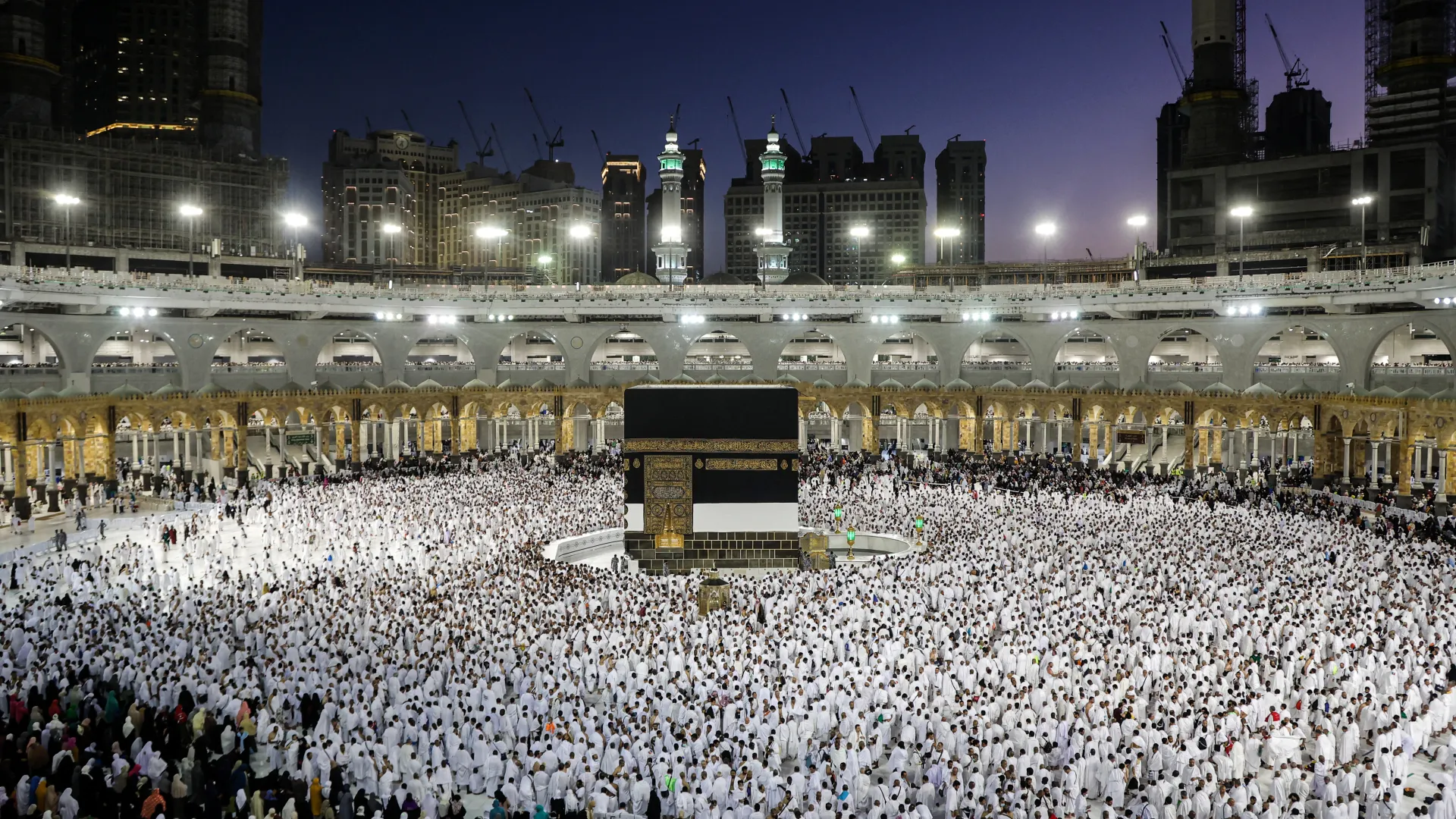
The Hajj is required of every Muslim at least once in their lifetime if they are physically and financially able. It is a demanding act that requires considerable time and energy, so it should be performed only once.
The reward for completing the Hajj is immense:
The 6 Pillars of Faith
Faith in Islam is based on six pillars, as taught in a famous narration by the Prophet Muhammad(ﷺ). These pillars are essential components that each Muslim must believe in and uphold throughout their life.
Pillar 1: Belief in Allah
Islamic scholars have extensively written about this, as it is the cornerstone of a Muslim’s faith. Belief in Allah means acknowledging He is the sole Creator, sustainer, ruler, and planner of everything. Allah is the Creator of the universe and everything within it, having brought it into existence from nothing. This belief forms the foundation on which the entire faith of a Muslim rests.
Muslims believe that all mankind was created to worship Allah alone. They hold that any worship directed towards entities other than Him is considered false. This belief involves recognizing Allah and His attributes as described in the Quran and the Sunnah (teachings of the Prophet Muhammad(ﷺ)).
A Muslim believes that Allah possesses unique names and attributes exclusive to Him. Importantly, nothing in existence resembles Him, underscoring His complete uniqueness and singularity in the cosmos.
Pillar 2: Believing in Angels
Angels belong to the world of the invisible. They have been created to obey Allah’s commands, and they never transgress His laws or commandments. Here’s a description of angels with verses from the Quran:
Muslims are required to believe in the existence of angels, viewing them as creations of Allah. Some angels are known by their specific names, such as Jibreel (Gabriel), Mikail (Michael), Israfeel, and Malik.
The attributes of angels are described in the Quran and the teachings of the Prophet Muhammad(ﷺ). For instance, it is taught that angels were created from light and that the angel Jibreel (Gabriel) possesses six hundred wings. Each angel is assigned specific duties:
- Jibreel is responsible for delivering revelations to all the messengers of Allah.
- Malik is appointed as the guardian of Hell.
- Ridwan is entrusted with the care of Paradise.
- Israfeel is tasked with blowing the trumpet to signal the beginning of the Day of Judgment.
A fundamental aspect of Muslim belief is that every human has two angels accompanying them, who record every action in a book, whether those actions are good deeds or sins. This belief underscores the importance of accountability in Islam.
Pillar 3: Belief in Revealed Books
In Islam, believing in all the books revealed to messengers is a fundamental part of faith. Many scriptures have been revealed throughout human history, and Allah mentions some of these in the Quran.
The revealed books include:
- The Torah revealed to Moses,
- The Gospel revealed to Jesus,
- The Psalms (Zaboor), revealed to David,
- The writings of Ibrahim (Abraham) and
- The Quran itself, which was revealed to Muhammad(ﷺ) (peace be upon them all).
Muslims must respect and believe in these books as they were initially revealed, recognizing them as genuine divine guidance handed down to humanity through Allah’s prophets. This belief underscores the continuity and consistency of the divine message throughout history.
It is indeed obligatory for Muslims to believe in all the books that Allah has revealed and in all the prophets and messengers that Allah has sent. This belief forms a crucial part of the Muslim faith, emphasizing the continuity and universality of Allah’s message.
Believing in the books revealed to the Messengers implies accepting that Allah divinely revealed them. These scriptures were given to humanity in various ways. For instance, Muslims believe that Allah revealed the Quran to Muhammad(ﷺ) through the angel Jibreel (Gabriel).
It’s important to understand that one of the reasons Allah revealed the Quran to mankind was to confirm the books of revelation that preceded it.
Pillar 4: Belief in God’s Messengers
Believing in all the messengers sent by Allah is a fundamental duty for Muslims. This belief extends to the messengers announced to us, those we know by name, and those who remain unmentioned. The Quran specifically names 25 messengers, including Adam, Idrees, Nooh (Noah), Hood, Salih, Ibrahim (Abraham), Lut (Lot), Ismail, Ishaq (Isaac), Ya’qoob (Jacob), Yusuf (Joseph), Shu’ayb, Ayoob (Job), Dhu’l-Kifl, Moosa (Moses), Haroon (Aaron), Dawood (David), Sulaymaan (Solomon), Ilyaas (Elias), al-Yasa’, Yunus (Jonah), Zakaria, Yahya, ‘Isa (Jesus), and Muhammad(ﷺ)—blessings and peace be upon them all.
However, Islamic tradition also acknowledges that many other prophets were sent across different times and cultures, whose names and stories may not have been recorded in the Quran. This belief highlights Islam’s universal and inclusive nature, recognizing Allah’s continuous guidance to humanity throughout history.
Prophets and messengers were chosen by Allah and sent to various nations throughout human history. Their mission was to call people to worship one God—Allah—without associating any partners with Him. They were also tasked with warning non-believers of the punishment of Hell and promising believers the reward of Paradise.
Some prophets and messengers are granted a higher status than others. Five messengers, in particular, received the title of Ulu al Azm (the most resolute): Noah, Abraham, Moses, Jesus, and Muhammad(ﷺ). Muhammad(ﷺ), who is regarded as the best of all messengers (peace be upon him), was the last Prophet sent to all of humanity, unlike earlier prophets who were sent to specific nations.
Allah chose these prophets and messengers as the best examples for their nations, endowing them with knowledge, understanding, guidance, the ability to perform miracles, and protection from sin. Muhammad(ﷺ) received more blessings than any before him. His greatest blessing was receiving the final scripture, the Quran, and serving as the last messenger sent to mankind.
Pillar 5: Belief in the Last Day
Belief in the Day of Judgment is a central tenet of Islam. It is the day when Allah will judge all humans based on their deeds. Every individual will be resurrected from their grave and presented with their book of deeds, cataloging both their good actions and sins. On this day, individuals will face the consequences of their sins and regret the righteous actions they failed to perform.
Belief in the Last Day encompasses several key elements:
- Belief in the punishment and bliss of the grave: This refers to the idea that the grave is a place where people may experience a form of punishment or bliss, depending on their actions in life.
- Belief in the resurrection: This is the belief that all humans will be resurrected after death for judgment.
- Belief in the judgment of the scales: This involves weighing an individual’s good and bad deeds to determine their fate.
- Belief in Paradise and Hell: These are the final abodes where individuals will reside based on the judgment they receive.
The concept of resurrection may seem unusual or difficult to understand for some. The Quran directly addresses these concerns in several verses, aiming to clarify and reinforce the reality of this event. Here is one such passage:
Pillar 6: Belief in Destiny ( Al-Qadar)
Belief in Al-Qadar, or divine destiny, is fundamental to the Islamic faith. It entails the understanding that everything that happens in the universe, good and bad, occurs by Allah’s will and decree. This belief is rooted in the conviction that Allah’s decisions are based on His infinite knowledge and wisdom.
To believe in Al-Qadar is to accept that Allah has predetermined every aspect of creation and events, not arbitrarily, but in a manner that aligns with His perfect knowledge of the past, present, and future. This includes the outcomes of all actions and the fates of all creatures. Embracing this pillar reinforces a Muslim’s faith in Allah’s sovereignty and trust in His ultimate justice and benevolence. This belief helps believers find peace and purpose in the events of their lives, understanding them as part of a divine plan that is ultimately for their good, even if the immediate outcomes are challenging.


